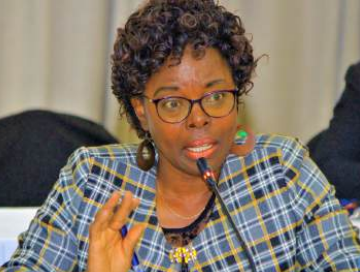
Kenya’s national debt has hit Sh11.7 trillion, after the National Treasury borrowed over Sh1.1 trillion in the last financial year, Controller of Budget Magret Nyakang’o has said.
In her report to the National Assembly Committee Public Debt and Privatisation Committee, Nyakang'o said the debt portfolio rose from Sh10.6 trillion in 2023/24 to Sh11.7 trillion in the 2024/25 financial year.
“Kenya's total gross public debt stock for 2024/25 is estimated at Sh11.7 trillion (67.8 per cent of GDP), an increase from Sh10.6 trillion (66.9 per cent of GDP) in 2023/24, driven by fiscal deficits and currency depreciation pressures, though fiscal consolidation efforts are projected to moderate growth,” Nyakang’o said.
The debt is composed of domestic debt at Sh6.3 trillion (54 per cent) and external debt at Sh5.4 trillion (46 per cent).
“Domestic debt has grown nominally from Sh5.4 billion in FY2023/24, reflecting an increased reliance on Treasury bonds and bills. Meanwhile, external debt rose from Sh5.2 trillion due to multilateral inflows.”
The CoB said that in the current year, Kenya's total public debt service (redemptions + interest other charges) reached Sh1.6 trillion, representing a significant escalation from previous years and consuming over 70 per cent of ordinary revenue.
Domestic interest payments dominated at Sh699.5 billion (including Sh678.3 billion on Treasury bonds and bills held by commercial banks and non-banks), while external debt service totalled Sh540.1 billion, comprising Sh332.7 billion in principal repayments and Sh205.3 billion in interest and charges.
Nyakang’o was appearing before the committee to submit her views to the Committee of Public Debt and Privatisation on the Annual Public Debt Management Report for the financial year 2024/25.
The report adds that the stock of government-guaranteed debt remains substantial, with exposure concentrated in State-Owned Enterprises (SOEs) such as Kenya Airways, KenGen, and the Kenya Ports Authority.
The National Government was obligated to settle significant guaranteed loans during the year-most notably the Kenya Airways guarantee, reflecting elevated risk related to SOE financial distress.
"Continued dependence on government guarantees increases the likelihood of future calls on these obligations, posing direct pressure on the Consolidated Fund and limiting fiscal space for priority spending."
The report signed by Stephen Masha on behalf of the Controller of Budget indicates that counties have accrued huge debts, which primarily consist of unpaid bills to suppliers and contractors, outstanding salaries, and, in some cases, loans secured with approval from the national government.
Unlike the national government, CoB says counties have limited borrowing powers and must seek approval from the National Treasury and Parliament before incurring debt, and despite these restrictions, many counties have accumulated significant trade arrears.
County Governments reported outstanding pending bills totalling Sh183.03 billion as of June 30 2025; the amount includes Sh130.80 billion for recurrent activities and Sh52.23 billion for development activities.
The pending bills for the County Executive as of this date were Sh177.95 billion, while the pending bills for the Assemblies amounted to Sh5.07 billion, the report adds.
“ An analysis of the aged pending bills for County Governments as of 30th June, 2025, revealed that the outstanding bills amount to Sh48.88 billion (27 per cent) under one year, Sh19.78 billion (11 per cent) for bills aged between one and two years, Sh20.34 billion (11 per cent) for bills aged between two and three years, and Sh85.42 billion (45 per cent) for bills older than three years.”
It adds, “The stock of pending bills in the County governments threatens fiscal discipline and sustainability. According to Regulation 55(2)(b) of the Public Finance Management (County Governments) Regulations, 2015, it is recommended that County Governments prioritise the settlement of all eligible pending bills in the budget as a first charge.”
Counties continue to accumulate unpaid contractors, halt work on crucial infrastructure and service delivery projects, and delay Salaries as public servants and service providers often face payment delays, which negatively impact their morale and financial well-being.
The CoB has cited legal disputes as suppliers take counties to court over unpaid bills, leading to costly litigation and reduced public trust due to persistent debt, which undermines public confidence in county administrations.
The controller says the country also faces negative economic impact as debt hampers local economic growth, as suppliers and small businesses struggle with cash flow issues.
















